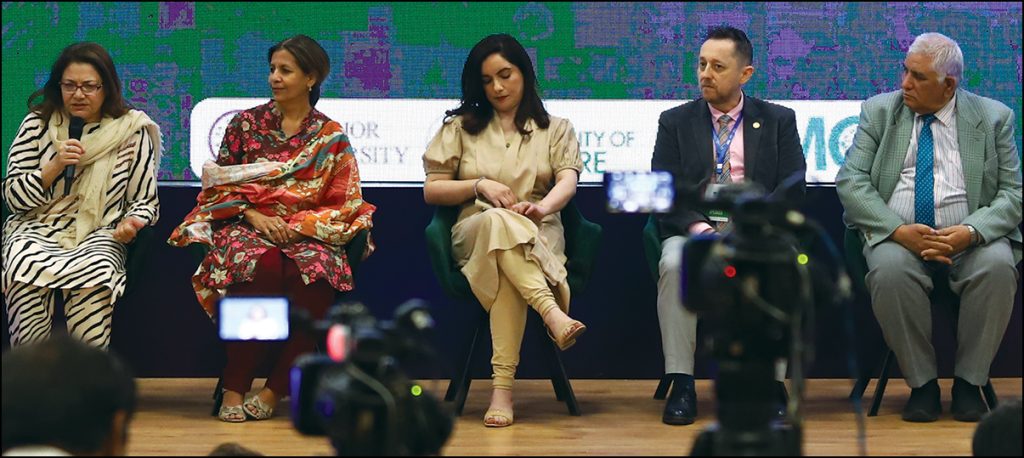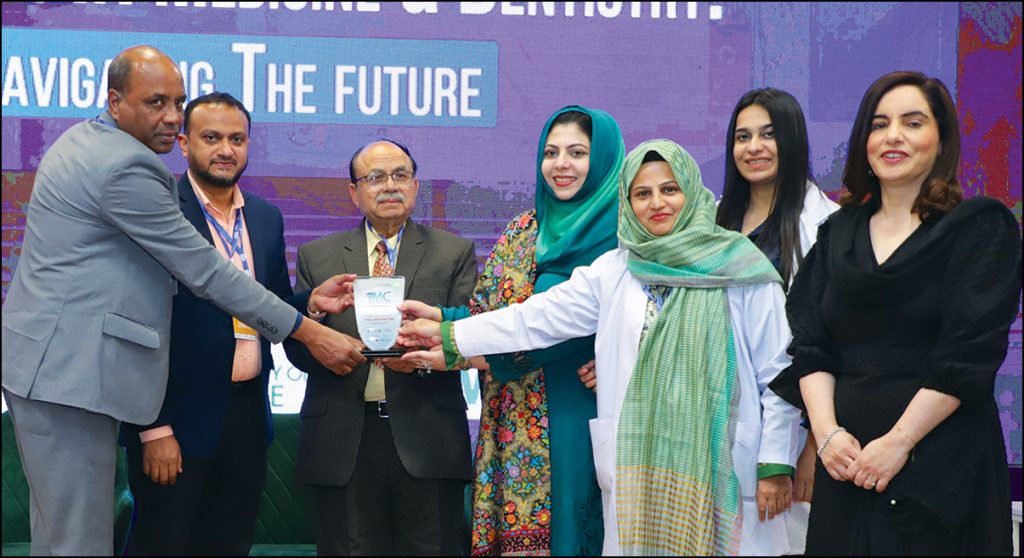In future more collaboration will be seen between universities, hence start recognizing each other’s credentials – Prof. Nasir Mahmood Well-developed
policy is first step towards integrity – Prof. Salim Razi
LAHORE: Prof. Umar Ali Khan from Isra University Islamabad was the first speaker in the first session on second day March 8th of the Internaitonal Medical Conference 2024 jointly organized by Superior University and University of Lahore in collaboration with Pakistan Association. of Medical & Dental Institutions (PAMI). Topic of his presentation was Power of Thinking: How to Think? He was of the view that make your mistakes quickly and move on. Develop skills to write best protocols. Document everything and try to keep it simple. It will work better. How to think better we have never been taught these skills. Since thinking Prof. Umar Ali Khan said is hard, so it is natural that people stop thinking. He further stated that improve thinking, take time to think. Writing focuses, you to start thinking, he remarked.

Prof. Lubna Baig Ansari (on extreme left) speaking at the panel discussion on
Use of Artificial Intelligence in academic writing and publishing in the age of Generative AI durning the International Medical Conference held at University of Lahore recently. Other members of the panel sitting on the dais from (L to R) are Dr. Zarrin Siddiqui, Prof. Mariya Hidayat, Prof. Salim Razi, Mr. Shaukat Ali Jawaid.
Prof. Salim Razi from Turkiya was the next speaker who discussed Ensuring research integrity in the new age of AI. He highlighted the importance of compliance with ethical and professional principles of standard practices. It consists of systems of values which serve as guidance for making decisions and taking actions in education research and scholarship. Speaking about the core values of research integrity he discussed functional values of academic integrity. These include courage, honesty, transparency, fairness and respect.

One of the participants at the International Medical Conference organized by University of Lahore being presenting a Memento by Prof. M. Akbar Choudhury along with Prof. Mahwish Arooj in the concluding session.
He also referred to responsible communication in science. He then referred to European Code of Conduct for research integrity which covers reliability, honesty, respect and accountability. We need policies to develop culture of integrity. He also talked about how to stop students from cheating, how to ensure students are learning. Well-developed policy is first step towards integrity. Culture of integrity should be sustainable, Policies, Codes, Guidelines are good and they should help others. He also referred to guidelines related to ethical use of Artificial Intelligence.

Prof. Nasir Mahmood from Allama Iqbal Open University talked about Open and Virtual Universities in AI age. AIOU, he said, has forty-five regional offices. Virtual university has no office. Course is delivered to the students through support system for which there is an institutional structure. There are flexible learning modules. He also referred to digital learning platforms. AI powered students support data analytics and learning analytics. He also talked about the future outlook of open and virtual universities. Learning, he stated, is possible in many ways and we learnt it in Covid. Students don’t have to come to the university every day. He highlighted the importance of networking of universities, collaboration between universities will be seen much more in future. Working in silos, he remarked won’t work.
At present accredited learning from one university is not acceptable to other universities. It is high time that they start recognizing each other’s credentials. Micro credentials should be considered. In future there won’t be huge campuses, students can learn from any other university. He also referred to the perceived quality concerns, social stigma and prestige bias. There are some technological barriers and lack of peer interaction. We do have some internet problems and at present online degrees are not accepted in Pakistan, he added.
Prof. Lubna Baig Ansari in her presentation on Unveiling Me: The Fear highlighted the issues related to use of General AI. She was of the view that there are issues of confidentiality, critical thinking.

The importance of doctor-patient relationship cannot be ignored. She also referred to emotional intelligence and regulatory compliance besides ethical considerations. She then talked about cost, resource allocation by the HEC and attitude of PM&DC. We can protect ourselves. Policies are being developed about guidelines for use of Artificial Intelligence. She concluded her presentation by stating that “Let us embrace AI, get trained and don’t be fearful”. The next speaker pointed out that in future universities will shrink and virtual universities will take over.
Panel Discussion
This was followed by panel discussion on use of Artificial Intelligence in academic writing and publishing in the age of generative AI. The panelists included Dr. Zarrin Siddiqui, Prof. Nadia Naseem, Mr. Shaukat Ali Jawaid, Prof. Lubna Baig and Prof. Mariya Hidayat. It was generally agreed that AI was useful but one needs to learn to use it intelligently. Guidelines by various professional bodies like Internaitonal Committee of Medical Journal Editors (ICMJE), Committee on Publication Ethics (COPE) have come up with guidelines that ChatGPT or any other AI tools cannot be listed as Authors since authors have to be responsible and accountable whereas this is not possible in the case of ChatGPT.
Authors using ChatGPT or any other tool must identify and ensure transparency and acknowledge their use and also identify particular sections where it was used. Mr. Shaukat Ali Jawaid remarked that he uses ChatGPT to improve professional writing and grammar check not to write. He suggested that one should write it and then get help from ChatGPT to improve it but having done so once again make sure that the revised document retains the essential information. There can be no substitute to human intelligence. Medical Editors he further stated must learn how to use AI tools in academic writing. It can help and facilitate in many ways, he added. Prof. Mariya Hidayat opined that review by humans was different as compared to review by AI tools hence they should be looked at differently.
Next session was devoted to AI in Advancing Medical and Dental Education.
Prof. Rehan Ahmed Khan from Islamabad was the first speaker who talked about the Pulse of Trust: Trusting the AI Technology behind educational and clinical decisions. He pointed out that one should be specific while asking questions. We are all dependent on AI. Factors that influence trust in human for AI were also discussed in detail. He also referred to Trust between Health Institutions and AI, the trust equation, empathy, integrity, competence, transparency and reliability. Prof.Rehan then shared results of certain studies related to Trust in AI in different countries which was between 61 to 67%. AI these days Prof. Rehan Ahmad Khan stated was being increasingly used in clinical decision making, hence we need to have trust in AI. Electronic Health Record System (EHRS) has improved diagnostics, personalized treatment has become possible while it has also resulted in cost saving, he added. AI will keep on taking decisions if it is not controlled.

AI decisions are data driven. He also mentioned about Deep Neural Network, Large Language Modules. He was of the view that let us build trust and optimize it. Optimal trust was important. He also referred to balanced trust between human and AI. It will take time for the trust equation to be strong between human intelligence and artificial intelligence, he added. Prof. Zafar Iqbal from Canada highlighted the potential misuse of AI platforms in the selection tools for undergraduate and postgraduate admissions. Publishing, he opined, must be human based and not AI based. In AI there are no reflections and no critical thinking. It will also affect our cognitive capabilities. He suggested that we must put the systems in place, no copy and pasting should be allowed.
We need to develop AI related policies and implement them. Funds allocation was also highlighted. We need multisectoral efforts in individual, institutional and national responsibility. We need to invest in human resource to promote research and we should be accountable for our actions, he remarked. Need for faculty development, student’s development, policy making and promotion of research culture was also highlighted. AI it was further stated must be under human control.
Dr. Masood Jawaid was the next presenter whose topic was “The Synergy of Intelligence: How AI enhances undergraduate education”. At present, he said, we are not effectively using AI. It is not recommended for research. We have people with different mindset. The result is that students are worried, faculty is overburdened. It was first in 1950 when it was discussed that can machine think? Now it has become reality. He also referred to personalization of learning.
There is shortage of knowledgeable teachers with medical and AI degrees. He also talked about budgeting, LMS, learning compliments, AI integration. He suggested that let us start experimenting, try to learn, the result will be students will be happy and faculty will be happy. However, AI is no match for natural stupidity, he remarked.
Dr. Ken Masters spoke through Video link on AGI’s implications for Health Professions Education: How to prepare”. He referred to personalized learning. AI can serve as personal Virtual Health Assistant, Personal Nurse. However, there are ethical issues in AI in Health Professions Education. We should be prepared to look into our own soul and conscience. Let us now get started. Individual teachers can be champions but we have to do it at institutional level. We need to understand current state of AGI the current Tsunami in ChatGPT. If we don’t get started, we will be swept away, he added.
Concluding Session
Speaking in the concluding session Prof. M. Akbar Chaudhry from Superior University thanked University of Lahore and PAMI for their collaboration in this academic activity. Let us try to learn and use AI intelligently, he added.
Prof. Mughees Baig from University of Lahore commended the HEC, PM&DC and numerous other medical institutions, universities who joined hands and collaborated in this international conference on Artificial Intelligence and made it a success.
Prof. M. Ashraf Rector of University of Lahore in his concluding remarks pointed out that it provided a rare opportunity for the students as well to see how AI acts and performs. Such collaboration in academic activities should be a regular feature. A Policy Document on the use of AI has been prepared and this document has input from all the related stakeholders. AI will have an impact on humanity, creativity. We have to give a message. If we have to adopt AI and other AI advanced tools, it needs more funds and regulations were also very important. It is for the institutions to implement the document and follow it.

Facilitators of the CME Courses run by UHS in collaboration with PAME photographed on the last day of the First Contact Session on March 2nd 2024. Picture from (L to R) shows Prof. Jamshed Akhtar, Prof. Nadia Naseem,
Prof. Akhtar Sherin and Mr. Shaukat Ali Jawaid.



